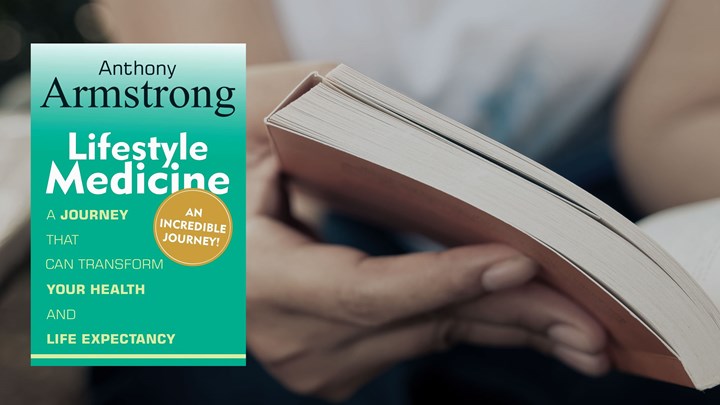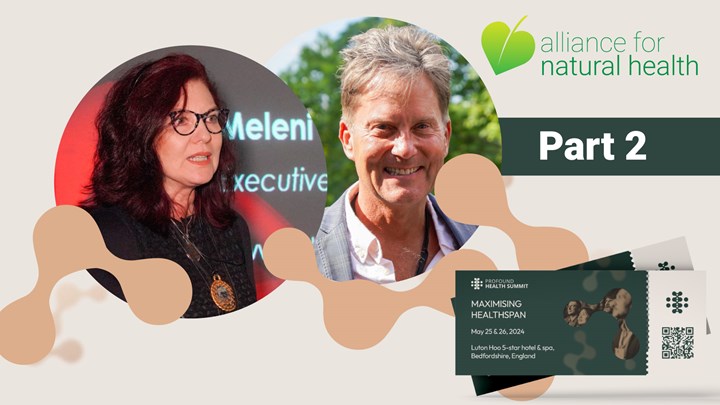Content Sections
There are times when a need for change is so great, and so desired, that a perfect confluence of events occurs that creates the necessary tipping point to make that change inevitable. It would seem that we have reached that time with regard to the provision of healthcare in the UK. All it needs is a bit more of a concerted push to topple us over the edge and let the changes cascade like dominoes. Could nutrition-minded UK medical students be important facilitators of this tipping point?
Creating a tipping point
The dismal projections on the future of the NHS, which is buckling under the weight of chronic disease, are not new, but they are reaching a new low. GPs, exasperated or overwhelmed by the stress of impossibly short consultation times, mounting patient demand and a lack of training in handling many of the conditions facing them, are leaving the profession in droves.
Last week we revealed that our revolutionary blueprint for a sustainable health system is on the brink of being released for consultation. After 16 years of experience-gathering and 2 years in creation, the blueprint has Solution tattooed across its core.
This week BBC Radio 4’s programme, Doctor’s Orders: Getting tomorrows medics cooking, revealed the monstrous lack of training in nutrition that our medical students are receiving. The programme also highlighted an initiative led by medical students at Bristol Medical School, Iain Broadley and Ally Jaffee, called Nutritank. Recognising the importance of nutrition and lifestyle in healthcare, medical students are being forced to take matters into their own hands and search out their own education. Nutritank was launched in October 2017 and already has society branches in over 15 medical schools across the UK with another 5 on the way. Its rapid progress is clear testimony that the will is there, and that medical students recognise that their training is inadequate preparation for effective clinical practice.
Resetting the terrain
In our blueprint for a sustainable health system we acknowledge that the complexity and multi-factorial nature of chronic diseases is well-recognised. However, there is little agreement in primary care, or among health professionals and the public, what should be the multiple areas of focus required to ensure an individual either maintains good health and resilience — or has the best chance of restoring health from a diseased or less than optimal state of health. A wider, systems approach to medicine that views humans as the complex organisms we are, moulded and modulated by complex interactions between our genes, our food, lifestyles and changing environments, is sorely needed.
ANH-Intl’s whole-system ‘terrain re-setting’ approach takes into account the importance of a tiered delivery system: self-care, guided self-care and practitioner-led care and interventions. All of which have to be part of any sustainable health system if we are to turn the healthcare tide. As Courtenay Heading from Jurby Wellness expresses so succinctly, “Excess human body weight and disease now has more costly names, including: obesity and diabetes. Both are global problems and with huge emotional tolls, physical burdens and financial costs. Those costs are in the hundreds of £/$/€ billions each year and still growing. Some people are growing fat – on that spending alone. The obesity epidemic is overwhelming health services and budgets – resulting in mis-allocation of huge resources.”
Nutritank’s mission to create a network of interconnected society branches (‘Nutritanksocs’) as an innovation hub for food, nutrition and lifestyle education resets a different terrain. That of clinical education for medical doctors, which is essential if primary healthcare is ever to become sustainable – and effective – for the range of chronic diseases decimating the population. The medical students signing up for Nutritank membership all have a desire to empower young people and communities to make a change through education. They also aim to promote the need for greater nutrition and lifestyle medicine training within medical education. Halleluja! It’s the same desire that we, and so many of you, have held so dear and for so long. But reaching any tipping point takes time and is, at least in part, a numbers game.
Backed by heavy-weights
It’s early days, but Nutritank and its network of societies has all the hallmarks of success – including an A list of medical heavy-weights with track records of being on the right side of the nutrition and lifestyle divide.
In the esteemed line-up you’ll see household names such as BBC Doctor in the House star, Dr Rangan Chatterjee, Dr Michael Mosely, Dr Aseem Malhotra, Prof Sumantra Ray and Dr Rupy Aujla of the Doctor’s Kitchen fame and provider of the first culinary medicine course for medical students.
When faced with the question of whether nutrition and lifestyle medicine could be squeezed into an already packed medical curriculum, Michael Mosely said, “It’s easy to take some things out of courses to fit nutrition in. A change is coming.” Dr Chatterjee added, “Given that the health landscape of the UK has changed dramatically in the last 30/40 years. We can’t say anymore we don’t have time in the curriculum”.
So, how’s this? Given the dire need to move away from the failing 'pill for every ill' model, the 2 plus years out of 6 spent on drug pharmacology in the medical curriculum could be cut in half to allow for education on nutrition and lifestyle intervention. Then in the 3 years of clinical training – medical students could learn how to put it into practice.
Tipping point you ask? We’ll leave the last word with Fiona Godley, Editor in Chief of the British Medical Journal, who was central to the Sunday Times and BMJ attacks on Andrew Wakefield over the possible MMR/autism link. Dr Godley does more than acknowledge the lack of nutrition training for medical students, she says that, “What has changed is the recognition of the place of good food in people’s health”. She also recognises that the science of food research is inherently problematic, and that the public are confused too. Given the growing body of research that needs to be published in open access, she reveals that there will be a new open access journal launching in June 2018, BMJ Nutrition online.

What you can do…
Don’t think as a member of the public you can’t assist these young, soon-to-be doctors. You can. And not just in the UK. Much of the reason these young medical students are clamouring for more information is they know where the science is at, they know what patients’ needs are – and they know just how much is missing from their training.
So the next time you go see a conventional doctor – in clinic – or socially – just keep asking the questions. Here’s an example: “Doctor, what can I eat, or how should I eat to make my [insert ailing body part/system] to feel better? Is there anything I can do in terms of specific activity, or relaxation practices? Can you recommend some things I can do to help me sleep better than don’t involve sleeping pills”.
So please, just keep asking those kinds of questions – because that’s the grassroots pressure that has triggered the latest revolution. And we all need that revolution to keep rolling!








Comments
your voice counts
28 March 2018 at 8:50 pm
YES, at last, this is ruddy brilliant news.
29 March 2018 at 12:41 pm
Yes, Sophie! It's a start at least! Momentum is definitely building! Best, Rob
28 March 2018 at 10:24 pm
I am truly hopeful when I read this report. Help as much as I can by posting these reports onto social web sites, and by sending them to interest groups however, can you suggest any other ways that support can be given to this long overdue change that is urgently required ?
29 March 2018 at 12:34 pm
Dear Norman, we're very grateful for all your help in sharing our stories - it's useful getting this information as far and wide as possible and engaging friends, family members and colleagues in discussion on these issues. Hopefully some are then prepared to share their views with elected representatives both at a local and national level, in Westminster. One of the most empowering things for people is learning how complex conditions that are not generally successfully treated using drugs can be resolved using natural means (e.g. dietary, lifestyle changes, botanicals, supplements, other non-pharmaceutical measures). This is especially the case where there's evidence that drugs have been used for extended periods and failed to deliver much in the way of benefit. The Hawthorn project we're working on will enable big data on health outcomes to be collected and this could be very persuasive if it shows that those less reliant on pharmaceutical methods have better outcomes. Best wishes, Rob
29 March 2018 at 6:55 am
Great concept. But, as I reported to Dr Chatterer in an emessage a few months ago, wrong solution by trying to equip doctors. They are too busy and resilient to the idea that nutrition is a solution. Surely better it is left to the trained naturopathic nutritionists already there. GPs normally refer to better trained people so why not nutrition?
29 March 2018 at 12:23 pm
Absolutely - please refer to my reply to your other message. You've hit the nail on the head! And of course if we move to a more preventative system that tackles behavioural, physiological, psycho-social and other factors that, if unaltered, trigger pathogenesis and comorbidities downstream, there are a range of other health-related professionals who can be of vital support. This includes hypnotherapists, fitness professionals, body work practitioners, acupuncture, etc. In such a model, healthcare doesn't just happen in GP clinics, hospitals and other structures associated with a healthcare delivery system. It happens in homes, schools, workplaces, universities and other places outside the established system. Currently, the lack of statutory recognition of the kinds of nutritional practitioner that are in the best position to support patients acts as a barrier for MDs referring them. But that's something that needs changing - and is one of many goals of our position paper. Look forward to your input in due course. Best wishes, Rob
29 March 2018 at 9:52 am
Yes, yes. Change is needed soon. We also need to emphasise the role of vitamins and minerals and the recommended levels which are often woefully inadequate for good health. PLEASE also look at thyroid and adrenal diagnosis and treatment. TSH test not fit for purpose and likewise for synthetic T4 treatment. Patients find natural thyroid so much more effective. Many also find gluten/dairy free helps too.
29 March 2018 at 12:11 pm
Fully agree with you Maureen. It would probably take 3 years of nutritional training of doctors to bring them sufficiently up to speed so that they could provide effective protocols required for say complex neuro-endocrine, immunological or energy metabolism issues. If they then did prescribe armour thyroid, they would likely face GMC fitness to practice hearings because they're outside of NICE guidelines. Many docs who presently recommend gluten-free diets face the wrath of dietitians who demonstrate concern over the removal of a one particular food group. It's ironic that they seem less concerned about long-standing dietary approaches that involve removal of entire food groups e.g. vegetarians, vegans. How long before NICE guidance and dietitian training morphs to fit the current knowledge base? So better to use - at least in the interim - the existing expertise that's outside the NHS and often, in the UK, in the hands of practitioners who are qualified but not MDs. Best wishes, Rob
Your voice counts
We welcome your comments and are very interested in your point of view, but we ask that you keep them relevant to the article, that they be civil and without commercial links. All comments are moderated prior to being published. We reserve the right to edit or not publish comments that we consider abusive or offensive.
There is extra content here from a third party provider. You will be unable to see this content unless you agree to allow Content Cookies. Cookie Preferences